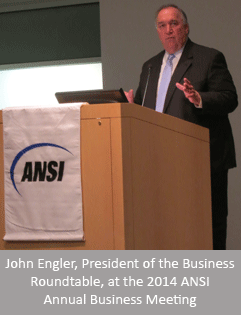
John Engler, president of the Business Roundtable (BRT) and former governor of Michigan, addressed attendees at the American National Standards Institute (ANSI) Annual Business Meeting on Thursday, October 23, 2014. Mr. Engler highlighted the pressing need for continued focus on workforce development and related issues and praised ANSI for its work in this important area.
The Annual Business Meeting, held this year at the FHI 360 Conference Center in Washington, DC, provides ANSI members with an opportunity to hear detailed updates regarding ANSI's activities and initiatives over the previous year, as well as discussion of the Institute's new and continuing priorities in connection with the U.S. and international standardization communities. The event is part of ANSI's popular World Standards Week (WSW) series of events, where members of the standards and conformity assessment community come together in the spirit of cooperation and collaboration.
In his remarks, Mr. Engler argued that a mismatch between employer needs and the skills held by job applicants was a major element in the continuing unemployment of 9.5 million Americans, an extremely high number when more than 4 million jobs currently sit open in the United States. He praised the recent passage of the Workforce Innovation and Opportunity Act, which reauthorized the Workforce Investment Act of 1998 and streamlined federal jobs-training programs, as a sign that effective government action was possible on jobs-related issues. Mr. Engler said that while "terms like ‘accreditation' and ‘credential' do not lend themselves to sound bites and 30-second TV ads … they are critical considerations as we build a workforce that helps us compete in Europe, Asia, South America, and Africa."
Mr. Engler also discussed workforce credentials and certifications, saying that they have the potential to help address the mismatch between employers and job-seekers, but noted that increased employer acceptance and improved transparency in the awarding of these documents were necessary to fulfill their full potential. In light of this pressing need, Mr. Engler praised ANSI for "stressing workforce issues and the contribution of high standards to training America's workers." He singled out Workcred, a new ANSI affiliate focused on workforce development issues related to credentials and certifications, for particular notice, saying, "Your creation of Workcred represents a strong signal from an important group that credentials have to mean more than an embossed piece of paper or a line on a resume."
Prior to assuming his current role as the head of the BRT, an organization representing the CEOs of leading U.S. corporations employing more than 16 million workers, Mr. Engler served as president and CEO of ANSI member the National Association of Manufacturers (NAM). His time in government included three terms as governor of Michigan and a 20-year tenure in the Michigan State House of Representatives and State Senate, where he served as the Michigan State Senate majority leader for seven years.
Photos from the 2014 Annual Business Meeting are available online. To learn more about Workcred, visit its official website at www.workcred.org. For more information about ANSI's accreditation work on workforce-related issues, check out www.ansi.org/accreditation.
About Workcred
Workcred is a private organization working to bolster understanding and awareness of workforce credentials and assisting efforts to increase industry recognition, transparency, and portability of these important tools. An affiliate of the American National Standards Institute (ANSI), Workcred maintains a separation from and respects the impartiality of ANSI's accreditation services.
About the Business Roundtable
Founded in 1972, the Business Roundtable is an organization representing the CEOs of leading U.S. companies with combined annual revenues of $7.4 trillion and employing more than 16 million people. It works to promote sound public policy and to support the continued health and growth of the U.S. economy through research and advocacy activities.